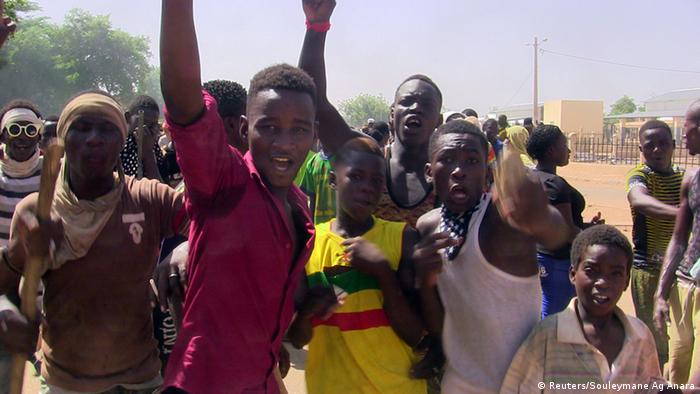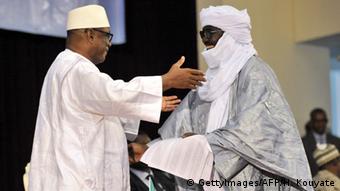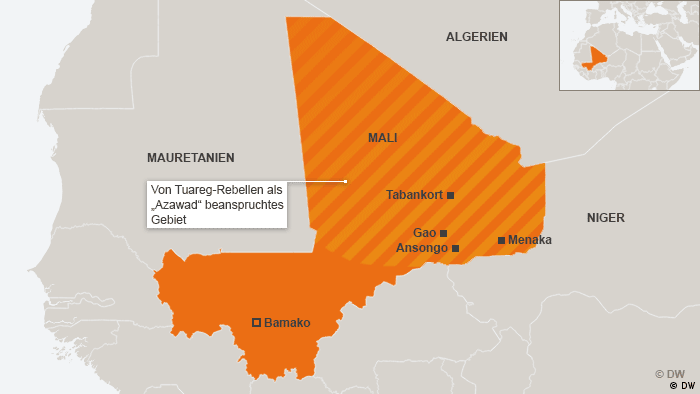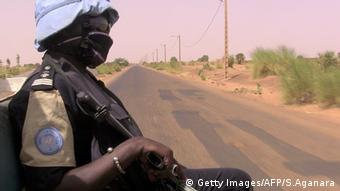Mali
Mali: The wrath of the youth
More terrorist attacks, more criminal Raids, more armed conflict: The Mali is a sad balance sheet one year after the conclusion of the peace Treaty. In the case of the young of Northern Malians, the frustration grows.

It starts as a peaceful protest walk. Then the car burning tires, demonstrators throw stones at police officers. The forces respond with tear gas and sharp Shot,
three protesters die by police bullets. These are scenes played out in the Northern Malian town of Gao, where in these days, hundreds of young people take to the streets to protest against the planned transitional authorities. After all, who gets the Post, will be decided not by choice, but by the Malian government in Bamako, together with the various rebel groups that ruled the North a few years ago. So a peace Treaty in may 2015.

In the case of the riots were shot dead on Monday three people
“The population is a majority against the transitional authorities, because they feared that former rebels come to Power,” says Marcel Maiga. He is a Board member of the Association living in Germany Malians, and travels several times a year in the desert state. Many young men felt by the Malian state cheated: “you had formed during the occupation resistance groups. They had worked for the state, and tries to give the rebels fits. Now the state helps might exactly these rebels to key Posts. So people are obviously not happy at all.”
The most dangerous UN mission in the world
In the spring of 2012, Tuareg rebels and Islamist militias had used the power vacuum after a military coup in order to bring vast areas in the North of Mali under their control. For decades, representatives of the Tuareg are demanding more autonomy for the territory they call Azawad. The Islamists groups expelled after the conquest, however, the Tuareg rebels from most of the cities and invaded at the beginning of 2013 further to the South. Until then, the French army intervened and forced the Islamists to the Malian-Algerian border area.

The main Tuareg movements signed the agreement in may
Meanwhile, a UN peacekeeping mission trying to stabilize the desert state. Two weeks ago, the security Council of the United Nations decided that the number of in Mali, soldiers stationed around 2500 to just under 13.300 increase. The MINUSMA deployment is considered to be the
the most dangerous UN Mission in the world: More than 100 blue helmets have been killed in the past three years. Germany is involved with around 500 soldiers in the Mission.
A Point Of Contention Demobilization
The blue helmets will help to monitor the implementation of the a year ago between the Malian government and various Tuareg rebel groups concluded a peace agreement. The paper provides, inter alia, that all groups recognize the government in Bamako. It is the North of the country, but also more rights and the former separatists have more influence – for example, by a representative of the local transitional authorities.

Originally, the rebels demanded the independence of the North – now you should be more autonomy given to
In the framework of the agreement, all of the fighters to surrender their weapons. Insurgents should be integrated into the Malian army or other financial or material incentives. An approach that is not without controversy: “Some groups are suspected to have the number of their fighters much too high,” Paul Melly, a West Africa-to consider, an expert from British think tank Chatham House. “It may well happen that men who were never fighters, to be set up in order to get resources.” Also, the fuel the Anger of the boys who were now in Gao on the road, says Marcel Maiga: “When the state is returned to Gao, they were the first to have voluntarily handed in their weapons. Therefore, they are not taken into account in the current demobilisation process, you will be made no job offers.”
The violence stops
In spite of the peace process, the violence does not break down in Mali. Still, many Islamist militias in the country are active – they had not participated in the negotiations. The Islamists will be made for the majority of the attacks on Malian and UN soldiers responsible and not act long ago just to the North of the country: last November,
raided Islamists, a luxury hotel in Bamako, and killed 20 people. Since then, the state of exception is in Mali, this Friday, he is scheduled to end officially. The risk of attacks will continue to continue to exist, says Mali expert Paul Melly. “The real challenge is, working to develop institutions, establish security, and to reconcile the people to each other. For this it is irrelevant whether the exception condition is true or not.”

The UN Mission in Mali is to be increased to almost 13.300 soldiers
At the same time, the centre of Mali are becoming more and more under pressure: The limited fertile tracts of land are not sufficient to feed the population. This leads to armed conflicts between cattle herders and arable farmers. Since a few months, a new Islamist group to expand their influence in Central Mali. “The reason why such conflicts can occur, is the absence of the Malian state,” says Marcel Maiga. “If the administration and the judiciary is not functioning, then of course each of the groups and individuals helps to Stoke violent conflicts, from which they benefit personally.”